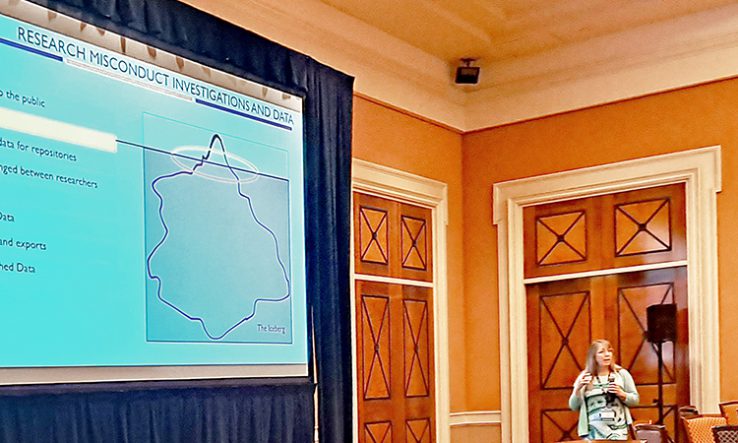
Image: Craig Nicholson for Research Professional
SRAI 2022: Investigators examining conduct concerns may need to sequester non-public research data, consultant says
Publicly available data is only the ‘tip of the iceberg’ of what might need to be examined when an institution is investigating concerns about research conduct, according to a specialist in ‘research data forensics’—the practices used to find other relevant data for analysis.
Mary Walsh, chief scientific investigator at Maidstone Consulting Group—who also works on data forensics at Harvard Medical School in the United States—told attendees at the annual meeting of the Society of Research Administrators International that non-public data are often needed to effectively address research conduct concerns.
This data will need to be sequestered by investigators using a thorough process for analysis alongside public data such as published research papers, Walsh (pictured) explained at the SRAI meeting in Las Vegas on 3 November.
Non-public data would ideally include raw data such as image files from a laboratory, as well as metadata like notebooks, Walsh said.
Obtaining and analysing such data will often take place in an iterative way, she said. Investigators will need to decide on the scope of the non-public data they should try to sequester, and this process should be specific to the allegations made.
Other questions to address include what skills the investigation team will need and therefore who should be involved, what equipment and devices will need to be accessed, and how such equipment and data will need to be stored.
It is “incredibly important” to document how data are obtained to protect their provenance, said Walsh.
Such investigations could be carried out by the research integrity office of large institutions like Harvard, she said, but also sometimes by research misconduct panels, which may lack forensics experience but be able to bring subject-matter expertise to bear.
‘Clueless’ faculty
Speaking at another session at the conference, Carly Pigg, a coordinator of grants and development at LSU Health Sciences Center in New Orleans, described how she and colleagues developed a data-ownership policy for the centre’s school of nursing on request from the dean of research, who was worried that faculty lacked an understanding of their data-management responsibilities.
Faculty “really had no clue” about their responsibilities towards their data before the policy was developed, Pigg said.
Developing the eight-page policy took about a year, which was much longer than the team expected when they began examining policies in place across the broader institution and elsewhere, she said.
Now that the policy is in place, Pigg said it will need to evolve to keep pace with updates to federal guidelines and will require extensive training of faculty to ensure that they comply.